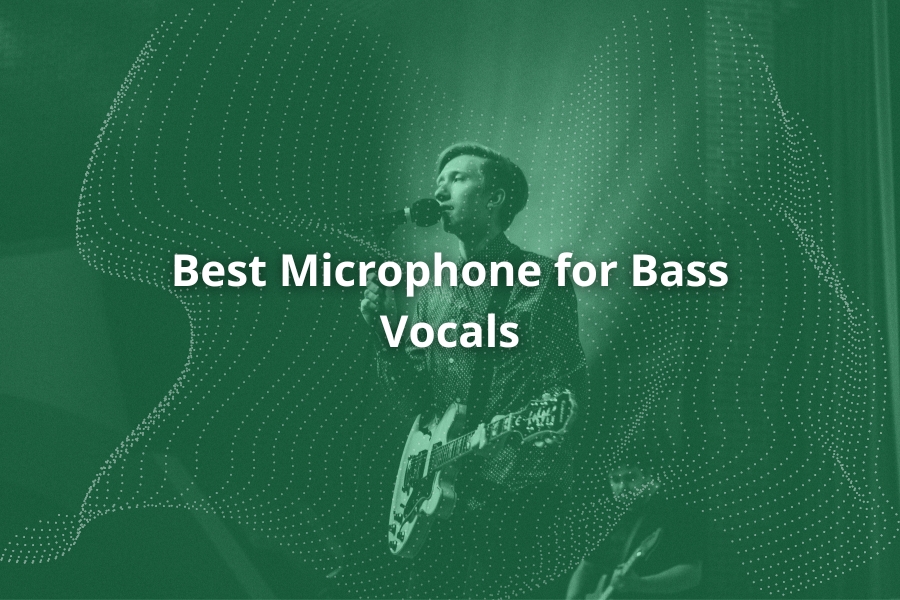Alright folks, gather ’round the speakers as we delve into the cavernous world of deep-voiced crooners! If you’ve got those Barry White vibes and your vocal range is snuggling down between D2 and E4, this blog post is your ticket to the best microphone for bass vocals. Whether you’re planning to belt out the blues or smoothly talk through a podcast, we’ve got the low-down on the best microphones that will do justice to your deep vocals.
First, let’s rap about what makes a microphone low-frequency friendly. Bass vocals require mics that are engineered to faithfully reproduce low-frequency sounds without distortion. This means the microphone needs a wide frequency response, with a specific focus on the lower frequencies and the ability to handle high sound pressure levels (SPL). This will ensure your rich, deep notes are accurately captured and not lost in translation.
Now, onto the burning question: Condenser or Dynamic microphones? Condenser mics, powered by phantom power, are the delicate divas of the microphone world. They are known for their sensitivity, wide frequency response, and the ability to capture fine details, making them a favorite for studio recording. Dynamic mics, on the other hand, are the roadies—robust and reliable. They can handle high SPLs and are great for live performances due to their sturdy build and resistance to feedback. Each has its place, but the choice between them largely depends on your use case and environment.
Now, let’s get down to business with our microphone reviews. We’ve separated these beauties into three categories: budget, mid-range, and higher-end mics. Regardless of your budget, you can find a microphone that’ll make your bass vocals boom.
Higher-end Microphones

AKG Pro Audio C414
Pros: Designed to deliver the sonic character of the famous AKG C12, this mic offers nine selectable polar patterns, three attenuation levels, and three different bass-cut filters to cater to a variety of applications. Its peak hold LED provides a visual indication of clipping, helping you keep track of your output levels. It’s definitely a big-kid mic.
Cons: This microphone requires phantom power between 9 and 52 volts, which may not be readily available in all setups. If you’re new to the game, this may be more than you need.
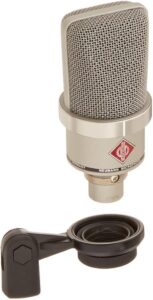
Neumann TLM 102
Pros: This large-diaphragm microphone features a compact design and very high maximum sound pressure level. A slight presence boost above 6 kHz helps vocals shine in the mix, and the cardioid directional characteristic helps isolate your voice. The TLM 102 gives a noticeable bass boost, earning it a spot on our list today.
Cons: A few users also report a humming sound during use. Again, this is a professional tool. Many mid-range or budget mics might serve you better before you treat yourself to an upgrade into this price bracket.
Mid- Range Mics

Heil PR 40 Dynamic Microphone
Pros: Known as a versatile tool that can be used by podcasters, studio engineers, YouTube streamers, and musicians, the PR 40 offers high-quality sound in any environment. Its dynamic nature eliminates the need for external preamps, which condenser mics often require. It’s also got an XLR connection and a cardioid pattern to help eliminate sound from unwanted sources.
Cons: The PR 40 is end-fired, meaning it needs to be aimed directly at the sound source for optimal results. This mic may not work as well for direct computer input.
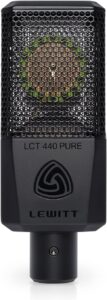
LCT-440
Pros: Known for its detailed, nuanced recordings, the Lct 440 is a true all-rounder that works equally well for vocals, guitar amps, acoustic instruments, and more. This kind of versatility is great for more than just your rumbling vocals. Its gold-layered 1″ true condenser capsule captures your signal with depth and clarity, even at high sound pressure levels.
Cons: Some users have noted that the included pop filter may not perform as well as a standard one, potentially impacting recording quality.
Budget Microphones for Great Bass
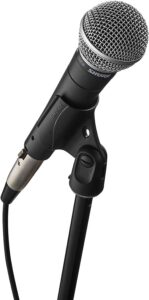
Shure SM58 Cardioid Dynamic Vocal Microphone
Pros: Known as an industry standard, this mic offers exceptional vocal performance with a tailored frequency response for clear and present vocals. It’s got a spherical mesh grille and built-in pop filter to keep unwanted noise out of your mix. Its cardioid pickup pattern isolates the main sound source while minimizing unwanted background noise, making it a versatile choice for both live performances and studio recordings.
Cons: It leans more towards studio recording than live performances. It’s a budget mic and won’t provide the crisp, precise experience of a more expensive piece of equipment.
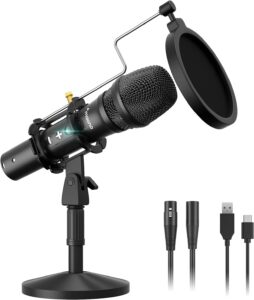
MAONO USB/XLR Podcast Dynamic Microphone,
Pros: Here’s a professional handheld dynamic microphone with USB/XLR dual-mode output, making it ideal for podcasting, recording, live streaming, vocal, voiceover, singing, home studio, and content creation. It offers zero-latency monitoring and volume control with a built-in cardioid capsule that captures sound in front of the microphone and reduces possible background noise from the other side and rear.
Cons: While it’s a sturdy piece of kit, the metal construction might not be as long-lasting as higher-end options. While many die-hards eschew pricer mics in favor of this one, it is still a more entry-level product.

Audio-Technica AT2010
Pros: With an extended frequency response and superior transient response, the AT2010 ensures smooth, natural sonic characteristics. Its high SPL handling and wide dynamic range offer unmatched versatility. Furthermore, the cardioid polar pattern reduces pickup of sounds from the sides and rear, improving the isolation of your voice. Its multi-stage grille design offers excellent protection against plosives and sibilance without compromising high-frequency clarity. Its sensitivity to lower tones makes it good for bass singers.
Cons: This microphone requires phantom power to operate, so you’ll need a setup that can provide this. There’s no provision for a battery.
Our Top Pick for the Best Microphone for Bass Vocals
Shure SM58 Cardioid Dynamic Vocal Microphone
Why this one, you ask? For starters, the SM58 delivers high-quality vocal reproduction, delivering crisp bass vocals at an astoundingly reasonable price. This means your deep, soulful bass tones will come through loud and clear every time.
So, for top-notch performance at a price that won’t break the bank, the Shure SM58 is our choice for the best microphone for bass vocals. Rock on, fellow bass singers! Rock on!


